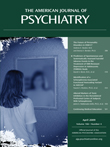Drs. Kendler and Zisook Reply
To the Editor: We appreciate the attention given to our article by Dr. Wakefield et al., and we agree entirely with the first two paragraphs of their letter. However, we were aware of their argument presented in their recent study (1) but considered it to be ill-founded and thus chose not to comment on it further in our own report.
The problem can be simply stated. As Dr. Wakefield et al. acknowledge, the DSM criteria for complicated bereavement includes more severe depressive episodes. In their study, a complicated depressive episode had to meet at least two of the following six criteria: 1) morbid preoccupation with worthlessness, 2) marked impairment, 3) psychomotor retardation, 4) prolonged duration (over 12 weeks), 5) suicidal ideation, or 6) suicide attempt.
Dr. Wakefield et al. then compared the complicated- and uncomplicated-triggered episodes on the following nine criteria, most of which themselves reflect severity directly or indirectly: 1) number of depressive symptoms, 2) melancholic features, 3) attempted suicide, 4) duration of longest episode, 5) excessive episode interference, 6) treatment seeking, 7) hospitalized, 8) received medication, and 9) number of episodes. Their conclusion that there are “large differences between uncomplicated- and complicated-triggered depression on virtually all pathology indicators” is, in our view, largely tautological in nature. In their study, the two groups were selected to differ on severity. This is particularly true for several of their validators (e.g., interference, suicide, melancholic features) that closely resemble the criteria by which the groups were chosen.
We agree with Dr. Wakefield et al. that the issue of whether the bereavement exclusion should be extended or eliminated is an important one. We also agree with the conclusion presented in their recent study that their “results, even if replicated, cannot by themselves fully resolve the issue of when to consider uncomplicated depressive episodes as nondisordered.” However, we disagree with the informativeness of their demonstration that complicated cases arising from bereavement or other stressors are more severe than uncomplicated cases. Therefore, we elected not to pursue similar analyses in our own data.
1. Wakefield JC, Schmitz MF, First MB, Horwitz AV: Extending the bereavement exclusion for major depression to other losses: evidence from the National Comorbidity Survey. Arch Gen Psychiatry 2007; 64:433–440Google Scholar



